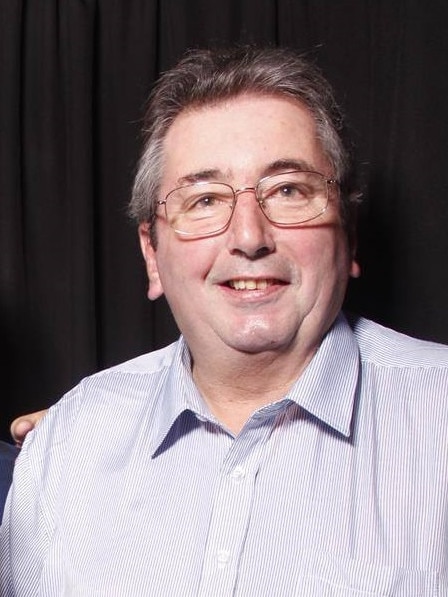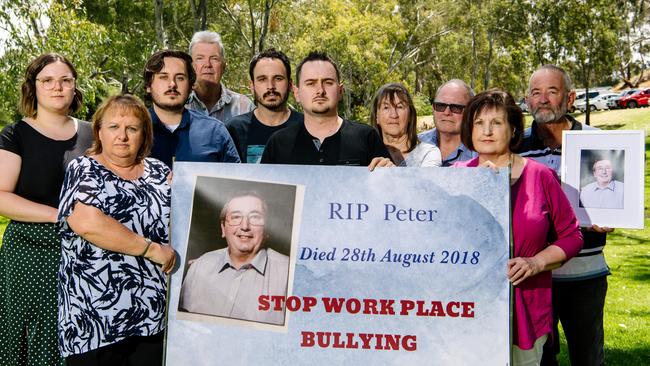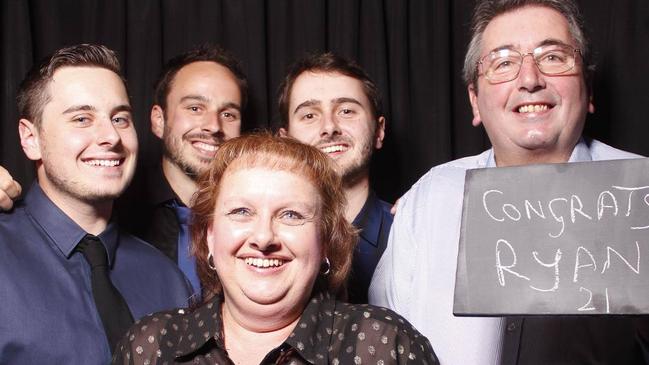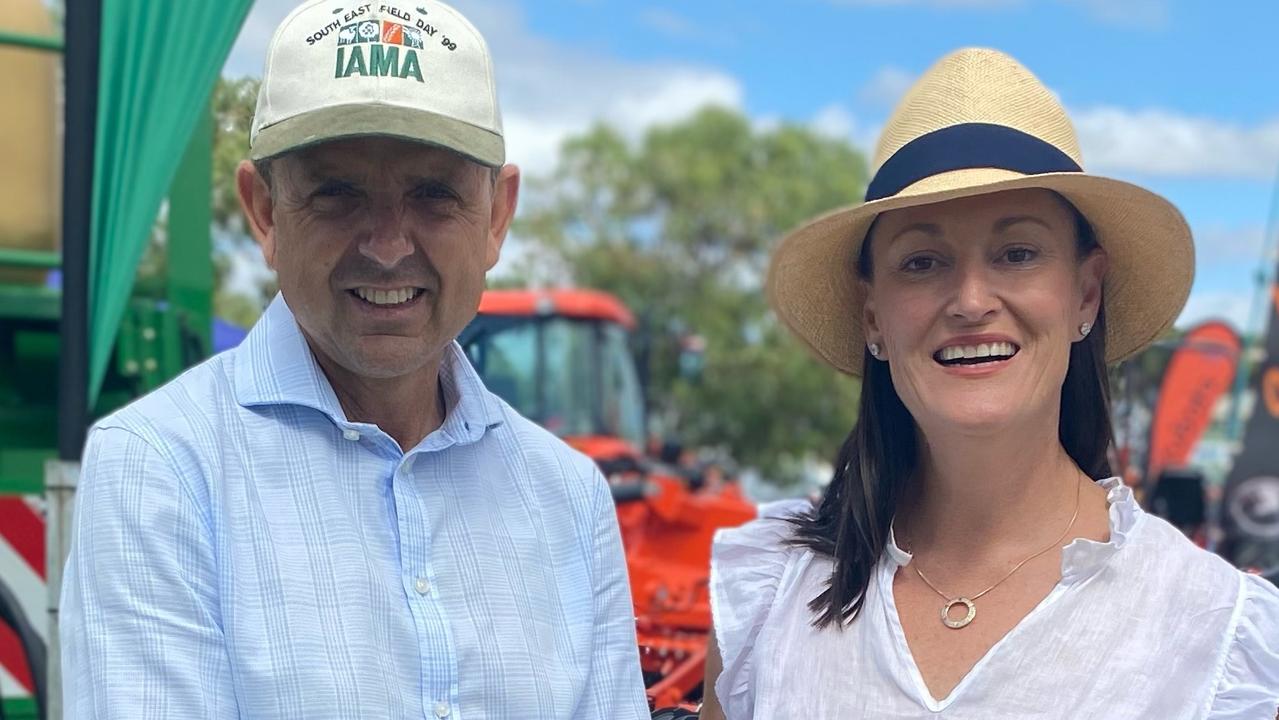Peter left for work and was dead before 10am – but his family cannot find out what happened
Peter Howard kept a diary of bullying he suffered for years before taking his own life in full view of his workplace. Now his family want access to police information.

SA News
Don't miss out on the headlines from SA News. Followed categories will be added to My News.
An Adelaide family is being denied access to government and police information over the death of a 59-year-old forklift driver who took his own life outside his workplace.
Calls are now being made by a workplace safety advocate and an independent MP to overhaul the state law preventing the family’s access to that information.
Peter Howard took his own life on August 28, 2018, in his car, while parked in full view of the Athol Park packaging factory where he worked as a forklift driver.
The family of the 59-year-old father-of-three is seeking a coronial inquest into his suicide death. The coroner’s office has been investigating the case for the past three years.
SafeWork SA – the state government body regulating workplace safety – had determined after a two-year-long investigation that there was insufficient evidence to proceed with prosecution.
The family – led by Mr Howard’s wife, Sharon, and sister, Carmel Schwartz – have been trying to access documents relating to Mr Howard’s death through SAPOL and SafeWork SA.
Ms Schwartz said the family refined its search to several key documents after being told there were 17,000 files relating to Mr Howard’s death.
The family’s revised FOI applications were denied under a clause of the Work Health and Safety Act 2012 (SA), which states information obtained by SafeWork SA or its inspectors is deemed confidential.
The family’s appeal against the decision not to release information has also been rejected by the State FOI Ombudsman.
“We should have a right to that information – not only to understand what happened … but to put our minds at ease that no stone has been left unturned in trying to find justice for Peter,” said Ms Schwartz.
SafeWork SA says that the Act sets out specific requirements on disclosure and includes significant penalties for breaching the confidentiality provisions under Section 271 of the Act.
Adelaide lawyer Andrea Madeley, founder of a group to support workplace injury victims and their families, said: “To address the issues that the Howard family have dealt with, section 271 of the Work Health and Safety Act 2011 (SA) should probably be subject to some Parliamentary review. I doubt very much it was ever the intention of parliament to do this to the grieving families and yet here we are.”
SA Best MLC Connie Bonaros said the family’s plight was another example of the state’s failing FOI laws and, with Section 271, needed amending by the state government.
“They are being told – at every turn – that they can’t share any information regarding the investigation of their husband, father, and brother. They have no closure and that is unacceptable,” said Ms Bonaros.
Treasurer Rob Lucas said the government would not review Section 271, however, it would review any proposed amendments to that section made by Ms Bonaros.

“Peter left home for work that day like any other – there was absolutely nothing different,” said his wife of 32 years, Sharon Howard.
She said the 59-year-old father of three – known as Howie to his friends – packed his lunch, headed off to his 6am shift at the Athol Park factory and was dead before 10am.
An independent report by an academic expert has confirmed “the unacceptable behaviour experienced by Peter Howard from his co-workers meets the criteria for workplace bullying” under the the state’s Health and Safety Act.
And a medical examiner’s report found Mr Howard’s employment was a “significant” contributor to his “psychiatric injury”.
His family do not know why he was targeted.
SafeWork SA – the state government body responsible for workplace safety enforcement – in August 2020 decided not to proceed with prosecution.
It says a “thorough” and “complex” two-year investigation into possible compliance breaches had determined there was insufficient evidence to prove the case.

A spokeswoman for the Coroner’s Court said it did not comment on ongoing investigations.
A SafeWork SA spokeswoman said: “SafeWork SA remains satisfied that a thorough investigation was undertaken, the investigation is complete and the matter is closed.”
She said the investigation into the death of Mr Howard was complex and had taken two years to complete.
She said if an investigation could not determine evidence to prove a breach of duty beyond reasonable doubt, then it followed that a prosecution could not be commenced as there is insufficient evidence to prove the case. “This was the case in the matter of Mr Howard,” she said.
In a statement, Orora Group said it had worked “extensively” to co-operate in the SafeWork SA investigation and had expanded its safety training to include “a comprehensive program” for identifying and responding to bullying and supporting mental health in the workplace.
“Orora and its remaining businesses do not tolerate any form of unsafe work practices,” it said.
The family has sought support from more than a dozen MPs across all parties, as well as workplace safety and victims’ rights advocates.
Adelaide lawyer Andrea Madeley, founder of a group which supports workplace injury victims and their families, said a coronial inquest would offer an important benefit to South Australia’s working community
“As a practising lawyer, I can attest to just how common this unacceptable workplace behaviour is in SA,” she said.

THE DIARY
Mr Howard kept a workplace diary for many years up to his death after he reported ongoing bullying to a union official who suggested he keep a record of events.
In copied diary entries provided by the family to the Sunday Mail, Mr Howard spoke of being targeted by colleagues and Orora by way of repeated tampering of his forklift, persistent skylarking, and verbally abusive taunts. He documents reporting the events to the company.
These are some of Mr Howard’s entries.
No date listed: “(Name of colleague removed) continually put wet rags on forklift seat. Always early in the morning when it’s busy. It (sic) funny once, twice – three times it’s annoying. The day my pants got saturated I walked out. Had please explain from (names of supervisors removed).”
10.45am, 27 June 2011 after returning to forklift: “When came back. Started to go drive when run out of gas. F – kwit (name of colleague removed) turn of (sic) tank. Why? No point reporting. Nothing gets done.”
1.30pm, 16 April, 2014: “Went to have a drink from my bottle to find objects in it. Hot feeling in my mouth. Chilli flakes in it. Asked (name of colleague removed) and (name of another colleague removed) if they did it …. Went to report it. Went home in disgust. No-one should put up with this bullshit.” He notes that a workplace investigation later issued the perpetrator with a written warning.
12.30pm, February 13, 2017: “Return from lunch. Went to start fork. Got 10 metres when it stopped. Gas tank turned of (sic) once again. Reported to (name of supervisor removed). You have got to be kidding. Turned off four times in six working days … Totally pissed off.”
THE DAY HE DIED
On August 28, 2018, Mr Howard left his northern suburbs home to start a 6am shift at the Athol Park factory.
At some point after arriving that day, Mr Howard was upset by an issue with one of his colleagues, a witness statement dated October 2018 reveals. The statement was obtained by Mrs Howard’s lawyers under Freedom of Information provisions.
The statement claims Mr Howard was later seen by colleagues sitting down “distressed” before leaving the premises. He then returned at about 9.20am and took his own life outside his workplace.
The Athol Park plant was sold by Orora’s Australasian fibre packaging business in April 2020 to a company called Opal.
THE EVIDENCE
1. Mr Howard had been exposed to repeated workplace bullying and that the “unacceptable workplace behaviour experienced by Peter Howard had a significant impact on his mental health”, UniSA work and organisational psychology expert Professor Michelle Tuckey wrote in her July 2020 report to SafeWork SA.
2. Mr Howard “was suffering from a psychological injury that occurred out of or in the course of employment and for which employment was the significant contributing factor” and that his death is “a compensable ‘injury’ in relation to the Return To Work Act 2014”.
This was in an email sent last year from work insurance group Gallagher Bassett Services (GBS) Pty Ltd, GBS manages claims on behalf of ReturnToWork SA, which is the statutory body that administers South Australia’s workers compensation scheme.
Mrs Howard received the maximum compensable, and undisclosed, amount entitled to her claim for death benefits.
3. There are numerous medical and work records and reports that were obtained by Mrs Howard’s lawyers through ReturnToWork SA and under Freedom of Information laws. The documents stated:
■ Mr Howard had made formal complaints and incident reports to Orora in 2017 and 2018 relating to unacceptable behaviour by colleagues at his workplace.
■ He was seeking medical support to deal with work-related stress, was working through a mental health plan and on many occasions took sick leave to recover and manage that stress.
■ Mr Howard’s GP, Dr Barry Nicholson, said Mr Howard complained of ongoing issues at work from 1992 to the last time he saw him three weeks before his death in 2018. Dr Nicholson said Mr Howard reported “incidents at work, over a prolonged period of time, where he was teased, his work interfered with, practical jokes played and in which Peter complained to (the company.)”
■ Independent medical examiner and psychiatrist Dr Michael Schirripa in his medical report advised: “In my opinion employment was the significant contributing cause of his psychiatric injury and therefore a contributor to his death.”
*Supplied by the family
If you or someone you know needs help call the SA Health Mental Health Triage Service on 13 14 65 or Lifeline on 13 11 44 or lifeline.org.au




